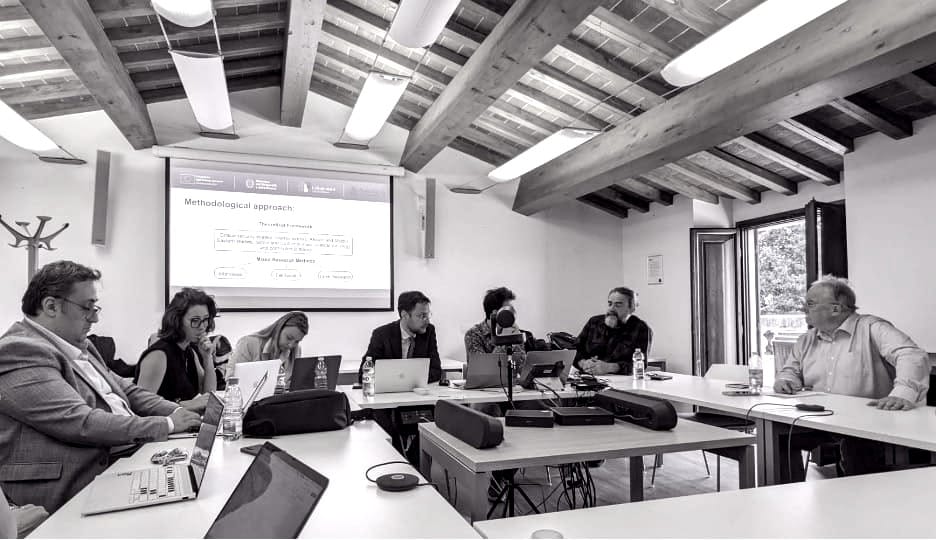On Friday, May 16, 2025, the research team of the NIJAR project was invited to present its preliminary findings at a workshop organized by the Muslim World Working Group of the European University Institute (EUI).
The project “NIJAR – Negotiating with Islamist and jihadi armed groups: practices, discourses and mechanisms across Asia and Africa” is a 24-month research initiative launched in December 2023, funded by the Italian Ministry of University and Research under the Research projects of relevant national interest (PRIN), with the support of the Next Generation EU Fund. Led by the Sant’Anna School of Advanced Studies (SSSA) of Pisa and the Catholic University of the Sacred Heart (UniCatt) in Milan, NIJAR investigates the factors enabling or impeding negotiations with militant Islamist and jihadi groups across five case studies: Mali, Niger, Somalia, Lebanon, and Syria.

The workshop offered a unique opportunity to share NIJAR’s preliminary findings and spark comparative reflection across diverse settings. NIJAR’s researchers presented insights into the evolution, status, and outcomes of dialogue initiatives, with a focus on the strategic framings, doctrinal justifications, and contextual conditions that shape them.
Francesco Strazzari (Full Professor of International Relations at SSSA and NIJAR Principal Investigator) and Martino Diez (Associate Professor of Arabic at UniCatt) introduced the NIJAR project’s aims, research questions, and methodological approach. They explained how the project combines desk-based research, semi-structured interviews (both online and during fieldwork), and discourse analysis. This methodology allows NIJAR to investigate both the political and theological dimensions of negotiation practices with Islamist and jihadi armed groups, exploring how religious and political legitimacy is invoked by states and non-state actors alike.

The workshop then turned to the preliminary findings from each case study. Marta Cavallaro, Research Fellow at SSSA, presented the Somali case, tracing the evolution of dialogue prospects between Al-Shabaab and Somali authorities from the early 2000s to the present. She identified key factors currently influencing the potential for dialogue – ranging from internal ideological dynamics to regional and international interventions – and argued that the Somali case can play a critical role in advancing negotiation theory beyond the dominant “ripeness” framework, offering instead a bridge with insights from critical peacebuilding scholarship.

Laura Berlingozzi, Postdoctoral Researcher at SSSA, followed with a presentation on local-level dialogues between communities and jihadist groups in Mali and Niger. She unpacked the nature of these local contacts, illustrating how interactions are shaped by immediate security and governance needs. Her analysis highlighted the different models of negotiation and local governance practiced by Islamic State- and al-Qaeda-affiliated groups in the region, and explored how communities perceive and navigate these engagements. The presentation underscored the importance of viewing these dynamics not through a strict global–local binary, but as situated at the intersection of local priorities and global jihadist strategies.

Finally, Amin Elias (Post-doc Researcher at UniCatt) focused on two different Islamist movements in the Levant: Hay’at Tahrir al-Sham (HTS) in Syria and Hezbollah in Lebanon. He emphasized how the ambition to seize or hold power fundamentally shapes each group’s openness to negotiation. While Islamist armed groups may share a broad ideological foundation, they differ significantly in their political strategies, organizational structures, and visions for society. Elias also discussed the varied understandings of jihad and attitudes toward dialogue held by other radical Islamic actors in the Syrian and Lebanese contexts, challenging monolithic interpretations of jihadist movements and reaffirming the need for granular, context-sensitive analysis.
The discussion that followed the presentations offered a rich and thought-provoking exchange, touching on several cross-cutting themes. A central point was the importance of understanding jihadist groups not as ideological anomalies emerging and operating in a vacuum, but as political actors rooted in specific socio-political contexts. These groups often articulate alternative visions of political, economic, and social order, stepping into governance roles in areas where state institutions are absent, dysfunctional, or have lost legitimacy. This calls for a more nuanced understanding of the hybrid nature of governance in conflict settings, where jihadists interact with, and at times complement or compete with, state actors, customary leaders, religious authorities, and local communities.
Another key theme concerned the conceptual ambiguity and analytical limitations of “jihadism” as a category itself. The discussion critically interrogated whether prevailing understandings of jihadist actors remain constrained by the legacy of the post-9/11 War on Terror narrative, and whether the term itself continues to offer analytical clarity. What does “jihadism” really mean today, and should academia begin to move away from it as a fixed analytical category? Should “jihadism” be viewed instead as a rhetorical and strategic label – often invoked by both state and non-state actors – rather than an essential identity or ideology? To what extent are struggles framed as religious in fact driven by more conventional political or socio-economic grievances, with religious discourse serving as a mobilizing tool rather than a root cause?
The workshop also addressed the evolving landscape of international engagement and negotiation. Traditional state actors are no longer the only players in the field: international NGOs, local mediators, religious institutions, and track II diplomacy initiatives increasingly play key roles in shaping dialogue processes. This diversification of actors raises questions about legitimacy, access, and the shifting nature of what constitutes a “negotiation.”
Finally, the discussion turned to the relationship between dialogue, peacebuilding, and deradicalization efforts. Often, deradicalization is framed as a post-conflict or counterinsurgency tool, implemented when jihadist groups are weakened or defeated. Yet cases like HTS in Syria challenge this assumption. Can HTS’s gradual move away from transnational jihad and increasing efforts to gain local and international legitimacy, as well as governance capabilities, suggest that deradicalization – or at least transformation – can also occur in the context of relative success and strength? This raises broader questions about whether ideological moderation is driven more by battlefield loss or political opportunity, and how such shifts are recognized (or not) by the international community.
Overall, the workshop was key for the NIJAR research team to share preliminary findings, engage in interdisciplinary dialogue, and receive constructive feedback that will inform the next phases of the project. As data collection comes to an end, looking ahead, the team will focus on both academic production and public dissemination to a broader audience. Stay tuned for more and, in the meantime, check out some of NIJAR’s recent publications!
· Laura Berlingozzi and Marta Cavallaro co-authored an article for The New Humanitarian on whether dialogue with jihadist groups can bring peace to the Sahel.
· Laura Berlingozzi also discussed this topic in a related podcast for The New Humanitarian.
· Amin Elias wrote an in-depth piece on the evolution of Hezbollah in the context of the current conflict with Israel and the recent death of its leader, published by Fondazione Oasis.
· Martino Diez appeared on the Swiss radio show “In altre parole” (RSI Radiotelevisione Svizzera), offering insights into key issues central to the NIJAR project, including regime change in Syria and the political significance of recent Nasrallah’s funerals in Lebanon.

